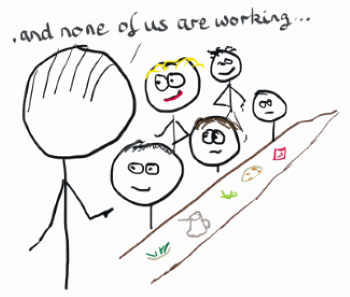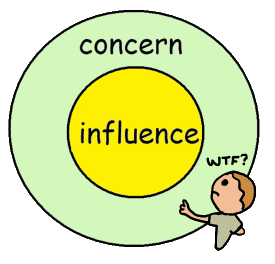Too Many Managers and Too Few Workers
This article critiques companies for their oversupply of pointless managers.
It focuses on corporations that undervalue the employees who produce the goods, handle customers, and keep the business running smoothly. Managers fresh out of business school, with degrees that often lack real-world relevance, add layers of bureaucracy without adding value.
This isn't a balanced view of management or corporate strategy—if you’re looking for that, check out Forbes or LinkedIn. Instead, this is a simple, frustrated moan from a worker drowning in red tape.
Enjoy reading it during your next pointless meeting—because, let’s be honest, there might be just one important takeaway, if any.
It focuses on corporations that undervalue the employees who produce the goods, handle customers, and keep the business running smoothly. Managers fresh out of business school, with degrees that often lack real-world relevance, add layers of bureaucracy without adding value.
This isn't a balanced view of management or corporate strategy—if you’re looking for that, check out Forbes or LinkedIn. Instead, this is a simple, frustrated moan from a worker drowning in red tape.
Enjoy reading it during your next pointless meeting—because, let’s be honest, there might be just one important takeaway, if any.

"Enjoying a Meeting" by Mark Ewbie
Short-Term Thinking
The company I work for outsources labor to the Philippines, drastically cutting the in-house workforce in favor of our overseas 'partners'—a high-level management decision.
Everyone working with this resource knows the quality isn't great. Sure, they’re cheap, but you can’t just throw endless cheap labor at problems and expect real solutions.
There’s no arguing with management; they don’t work with them, so they don’t see the issues.
Replacing valuable local knowledge with less competent outsourced labor might offer short-term savings, but it leads to long-term problems. Just look at the “improved” service in banking and airlines.
Everyone working with this resource knows the quality isn't great. Sure, they’re cheap, but you can’t just throw endless cheap labor at problems and expect real solutions.
There’s no arguing with management; they don’t work with them, so they don’t see the issues.
Replacing valuable local knowledge with less competent outsourced labor might offer short-term savings, but it leads to long-term problems. Just look at the “improved” service in banking and airlines.
Why So Negative?
I distinctly remember a loyal employee with thirty years of service, crying at her desk one morning. She was ‘let go’ just two years before her pension. They couldn’t wait for her to leave with dignity and compassion.
More and more friends and colleagues are being made redundant, outsourced, or offshored, all thanks to short-term thinking. These managers don’t know what people actually do or value experience, knowledge, or loyalty.
The new breed of managers have barely worked a day in their lives. They come straight from textbooks and get parachuted in by older peers who did the same.
There was a time when you could start from the bottom and work your way up, gaining knowledge and trust. Now, the management degree racket means no one needs to learn the job before taking over the workers.
More and more friends and colleagues are being made redundant, outsourced, or offshored, all thanks to short-term thinking. These managers don’t know what people actually do or value experience, knowledge, or loyalty.
The new breed of managers have barely worked a day in their lives. They come straight from textbooks and get parachuted in by older peers who did the same.
There was a time when you could start from the bottom and work your way up, gaining knowledge and trust. Now, the management degree racket means no one needs to learn the job before taking over the workers.
Lots of Important Managing
My work is brilliantly managed—by far too many managers.
Every task is determined, analyzed, planned, costed, budgeted, scheduled, discussed, and documented to death.
The preparation process for even the smallest task involves reams of paperwork, schedules, and plans—filed away and emailed to hundreds of people.
Of course, no one reads any of it. But they’re all part of the enormous team that ensures no one actually has the time to do anything productive.
Every task is determined, analyzed, planned, costed, budgeted, scheduled, discussed, and documented to death.
The preparation process for even the smallest task involves reams of paperwork, schedules, and plans—filed away and emailed to hundreds of people.
Of course, no one reads any of it. But they’re all part of the enormous team that ensures no one actually has the time to do anything productive.
Know-Nothing Management
As a manager, it’s crucial to have no clue about what you’re actually managing. This leaves your mind free for blue-sky thinking, ensuring you never accidentally do any real work.
When a task pops up, simply delegate it to a sub-manager. Breaking everything into tiny chunks is key to making sure no one has a complete idea of what’s going on. Plus, it demands even more management, which helps you build a buffer of resources beneath you.
After all, when the corporate cost-cutters arrive, you’ll need plenty of fat to protect your position.
When a task pops up, simply delegate it to a sub-manager. Breaking everything into tiny chunks is key to making sure no one has a complete idea of what’s going on. Plus, it demands even more management, which helps you build a buffer of resources beneath you.
After all, when the corporate cost-cutters arrive, you’ll need plenty of fat to protect your position.
Managing the Managers
In the old model, one manager might oversee ten people, who in turn manage ten each—creating a pyramid of well-managed worker ants.
Not anymore. With today’s specialization, everyone needs a degree just to know which way is up. Even better, they can call on someone else to tell them, leading to a flood of job titles.
Specializations become more incomprehensible, but they sure sound important.
Now, a manager often co-manages with other managers. Armed with "soft skill sets" and buzzwords, they’re experts at ensuring the survival of the management pool. Workers and profits? A distant second.
Not anymore. With today’s specialization, everyone needs a degree just to know which way is up. Even better, they can call on someone else to tell them, leading to a flood of job titles.
Specializations become more incomprehensible, but they sure sound important.
Now, a manager often co-manages with other managers. Armed with "soft skill sets" and buzzwords, they’re experts at ensuring the survival of the management pool. Workers and profits? A distant second.
What Happened to the Pyramid?
In the old model, companies had a few managers at the top, with plenty of productive workers beneath them.
But modern management has turned into a bloated, self-fueling drain on resources. Each manager brings their latest, half-learned initiative from college—and those ideas need more managers to implement them.
Meanwhile, the original productive workers are downsized and outsourced, leaving the company a hollow shell of over-management and zero productivity. Management presents this as an achievement. The people above know nothing, and those below are long gone.
Oddly, the management pool never shrinks. Everyone’s a manager of something, and boy, do they look busy. So many plans, documents, presentations, and charts are created that new roles are needed just to manage all of it.
If only a consultant could come in and say, “You have too many managers and not enough workers.”
Then we might have companies that actually make things instead of being white-collar wastes of space. Of course, that idea would never get past the management team. After all, who would be left to run the endless meetings?
But modern management has turned into a bloated, self-fueling drain on resources. Each manager brings their latest, half-learned initiative from college—and those ideas need more managers to implement them.
Meanwhile, the original productive workers are downsized and outsourced, leaving the company a hollow shell of over-management and zero productivity. Management presents this as an achievement. The people above know nothing, and those below are long gone.
Oddly, the management pool never shrinks. Everyone’s a manager of something, and boy, do they look busy. So many plans, documents, presentations, and charts are created that new roles are needed just to manage all of it.
If only a consultant could come in and say, “You have too many managers and not enough workers.”
Then we might have companies that actually make things instead of being white-collar wastes of space. Of course, that idea would never get past the management team. After all, who would be left to run the endless meetings?
Example of Pointless Over Management
I was given a simple, easily achievable task—not rocket science or open-heart surgery.
Last week, at five minutes' notice, I had an hour-long meeting with two people: a project manager and my immediate line manager.
That’s one worker, two managers, and an hour of productive time wasted. Luckily, their time wasn’t missed—they don’t actually do anything.
The next day, I had another hour-long meeting with the same manager to discuss the SAME thing. And soon, he wants ANOTHER meeting to rehash it all.
Here’s a thought: Instead of endless meetings, why not roll up your sleeves and get some real work done? Or, better yet, just let the worker handle it.
Last week, at five minutes' notice, I had an hour-long meeting with two people: a project manager and my immediate line manager.
That’s one worker, two managers, and an hour of productive time wasted. Luckily, their time wasn’t missed—they don’t actually do anything.
The next day, I had another hour-long meeting with the same manager to discuss the SAME thing. And soon, he wants ANOTHER meeting to rehash it all.
Here’s a thought: Instead of endless meetings, why not roll up your sleeves and get some real work done? Or, better yet, just let the worker handle it.
Project Management Tools
Management fads come and go—new methodologies, the latest from business gurus. Meetings, seminars, hotel stays, and expense account lunches are all part of the show.
One day it’s Waterfall, the next it’s Agile, with the same crowd showing off how they’ve embraced the latest trend. They’re on board, in sync, and managing to talk about work without ever doing any.
Overblown spreadsheets, incoherent project plans, and mind-numbing PowerPoints fill the hours. Another couple of productive meetings down—must be time for lunch.
One day it’s Waterfall, the next it’s Agile, with the same crowd showing off how they’ve embraced the latest trend. They’re on board, in sync, and managing to talk about work without ever doing any.
Overblown spreadsheets, incoherent project plans, and mind-numbing PowerPoints fill the hours. Another couple of productive meetings down—must be time for lunch.
Management Gurus
These are the people making money by selling absurd theories to senior management, who pretend to understand them.
After one exec read something from a guru, we had a meeting. We were each handed a sheet of paper with two circles: the outer labeled "Concern" and the inner, "Influence."
Puzzled, some checked if there was more on the back. There wasn’t.
For the next hour, we were told that increasing our "Influence" would shrink our "Concern." Maybe next meeting, we’ll get to color in or play with Lego.
After one exec read something from a guru, we had a meeting. We were each handed a sheet of paper with two circles: the outer labeled "Concern" and the inner, "Influence."
Puzzled, some checked if there was more on the back. There wasn’t.
For the next hour, we were told that increasing our "Influence" would shrink our "Concern." Maybe next meeting, we’ll get to color in or play with Lego.

Meetings Are NOT Work
Meetings aren’t work. They’re just an excuse to sit around, chat, snooze, daydream, and spout nonsense. They’re the exact opposite of work.
That’s why managers have endless meetings, while workers have very few.
The professional meeting-goers spend their days attending meetings, complaining about how "busy" they are, and then claiming overtime or time off for all that "effort."
If the CEO had any clue about his company, he’d calculate the cost of these meetings and replace the time-wasters with a few real workers.
That’s why managers have endless meetings, while workers have very few.
The professional meeting-goers spend their days attending meetings, complaining about how "busy" they are, and then claiming overtime or time off for all that "effort."
If the CEO had any clue about his company, he’d calculate the cost of these meetings and replace the time-wasters with a few real workers.
Emails Are NOT Work
Meetings and emails are the bread and butter of management. They forward, CC, and loop people in, making sure they avoid responsibility while convincing themselves they've worked hard.
But sending an email achieves nothing. It doesn’t make a product or close a sale. It just stops others from working because they have to read it and cover their own backs. A game of office politics wastes countless hours.
If our imaginary company boss cared, he’d track the email offenders and ask, “With all these emails, when do you actually work?”
But sending an email achieves nothing. It doesn’t make a product or close a sale. It just stops others from working because they have to read it and cover their own backs. A game of office politics wastes countless hours.
If our imaginary company boss cared, he’d track the email offenders and ask, “With all these emails, when do you actually work?”
Scared Managers
In the past, managers ruled the roost. They knew the task and simply told the workers to get it done—and it usually was.
Now, the fluff—meetings, emails, paperwork—comes from managers' fear of making decisions. They might get it wrong. They might get outsourced. They might fail.
Instead of managing, they spend more time covering themselves, delegating, and sharing responsibility. This fear of failure slows companies down, tying everything in knots.
We all make mistakes. Make one, admit it, and move on—better than slogging through decisions made by Teflon committee members.
Now, the fluff—meetings, emails, paperwork—comes from managers' fear of making decisions. They might get it wrong. They might get outsourced. They might fail.
Instead of managing, they spend more time covering themselves, delegating, and sharing responsibility. This fear of failure slows companies down, tying everything in knots.
We all make mistakes. Make one, admit it, and move on—better than slogging through decisions made by Teflon committee members.
The Unfinished Project
Unfortunately, I ran out of time.
Apparently, I wasn’t managed properly. Had I been briefed in meetings, added my thoughts to the project spreadsheet, and spent hours discussing the aims with consultants and the SWAT team, this page might have reached a more productive outcome.
See you at the next meeting—where we’ll discuss the Kanban board and figure out which part of the project manager’s body it’ll fit into.
Created by Mark Ewbie. Last Updated: August 30, 2025.

